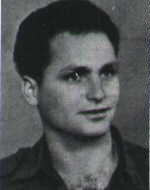Son of David and Sima. He was born on the 9th of March 1946 in Germany and immigrated to Israel with his family before he completed a year, and attended the elementary school in Kibbutz Mesilot in the Beit She’an Valley, grew up and developed as a “sabra” He spent much of his time studying, but found leisure time for sports, especially in swimming and tennis, and was chosen to be a counselor at the movement’s branch. He was an avid supporter of kibbutz and movement ideas, and in all the arguments in the family circle he would defend my views His passion was photography and wherever he went he took the camera with him, he liked to travel the length and breadth of the country and to perpetuate the Yaffa hours he spent in nature, and was drafted into the IDF in November 1964. Upon his induction There has been a turning point in his life. Representatives of the educational movement tried to coax him into turning to a year’s training, but he insisted: “The army is first.” He completed an officer’s course and then completed an officer’s course, and he took part in the Six-Day War and completed his regular service as a lieutenant. He was full of youthful vigor. Was organized and orderly and always was the first to overcome difficulties and come to the aid of his friends. When he came home on vacation he would dispel any gloomy mood among those around him, thirstily drinking the stories of his exploits. During those hours he liked to give his voice in song and even dance. He decided that if he was discharged from the army he would join a dance troupe. After his release, he returned to the kibbutz and invested all his energies and enthusiasm in his work, as was his wont in everything he dealt with. All his acquaintances felt that he had finally found his place in the kibbutz, where he would learn and bear the burden of the duties that would be imposed on him. However, his army commanders pressed him to return to service because the situation in the borders had worsened and the terrorist activity had intensified, and Yitzhak decided to return to the IDF, first with the approval of the kibbutz, and the following year he extended his stay in the IDF without authorization. , From the Jordan Valley to the Golan Heights: night ambushes and pursuit of terrorists in the days, he became a well-known figure among the units stationed along the border, as an officer who was very optimistic and believed in the IDF’s strength. His self-confidence, his composure, and his ability to weigh his actions well became known. His concern for his soldiers was paternal. He dealt with them and their personal problems, and even helped them with matters outside the military framework, so he was popular with them, despite the severity of his behavior during the battle. He was wounded for the first time in a battle with terrorists, but his spirit did not fall within him. He controlled himself at the hospital in Poriah, though his recovery lasted longer than he expected. Even after he was injured again, he did not give in to the family’s pleas to end his service in the IDF He seemed to be deliberating about the problem and finally he would accede to his mother’s wishes, Since the army was his main concern: he married a wife and began to plan many plans, and on his last position in the army, he was trained in an officers’ course: On Sunday, September 2, 1970, Captain Yitzhak was wounded while carrying out his duties. He was laid to rest in the cemetery in the tracks. The IDF General Staff gave the bereaved family a certificate of appreciation and honor for Yitzhak. The document states, among other things, that he “devoted himself to increasing the strength of the IDF and cultivating his spirit when the good of the country was in front of his eyes … and when he fell he sacrificed his life in theSo great and long for the freedom of Israel. . . “His immediate commander wrote in a letter of condolence to his family:” I only knew him a short while ago, but nevertheless his character and qualities could be immediately discerned quite clearly, because Itzik was very dynamic, March and initiative, a decent type, who always said what he saw fit, without pretense or considerations of external impression only. Already in his early days, stood out for his adherence to the ideas he believed in and his iron will. He had a lot of self-confidence, and everything he fought about was well-founded and persuasive for him. He was serious and even tough at work, but outside of working hours he turned out to be a cheerful guy who liked to be Simcha and Simcha, and was therefore loved and accepted by his friends, subordinates and commanders. Despite his disobedience to his subordinates in matters of principle he believed in, he was fair to them and always sought the possibility of helping, compensating, and softening his attitude to them on other planes. Itzik was an active partner in many battles that they conducted and showed great efficiency and courage. He was injured several times and recovered. It was very painful for us to leave – – – We will always remember Itzik as a leader and as a person who behaved like a model for everyone around him. “Kibbutz Mesilot published a booklet in his memory called Itzik.
